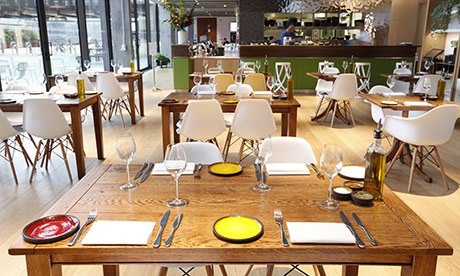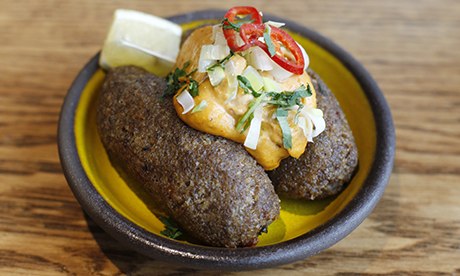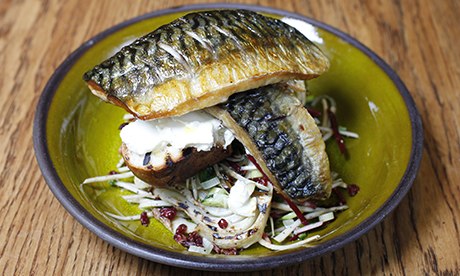
Clean lines: the open and light interior at JW3. Photograph: Katherine Rose for the Observer
Zest at JW3: 341-351 Finchley Road, London NW3 (020 7433 8955). Meal for two, with drinks and service: £70-£90
Something terrible has happened to my people. They have lost their way. It’s worse even than that whole 40-years-in-the-desert thing which, in any case, was just a map reading issue. This is about sense of identity. It’s about the very essence of what it is to be a Jew; or at least a north west London Jew like me whose forebears came from that bit of Eastern Europe, where a pogrom was the nearest anyone had to a spectator sport and the menus were written with the bitter winters in mind.
Yes, it’s all to do with dinner. For decades being an Ashkenazi Jew in London meant going nose down in lumps of salted meat, boiled to a point whereby you could eat them without a full complement of teeth. It meant pucks of shredded potato and onion that have taken a long, shameless bath in the deep fat fryer. There were pickled bits and dirty notions involving large amounts of chicken fat. Oh the things we could do with chicken fat. For decades this diet also held sway under the unforgiving, Middle Eastern sun of Israel, which isn’t that surprising. Many of the original Jewish settlers were Ashkenazis. This was what they ate. It was who they were.
Do I need to tell you this food is truly awful? A Jewish cuisine? Don’t be silly. It’s nowhere near refined enough to be called that. The only people who should ever talk about a “Jewish cuisine” are French Jews showing off their new kitchens. If it emerged now as a food trend, public health officials would set up outreach centres in an attempt to nudge people away from a lifetime of ever-hardening arteries. But it’s our food. It’s my food. And I love it.

Tuna croquets. Photograph: Katherine Rose for the Observer
So what’s gone wrong? I’ll tell you what’s gone wrong. The food of the Ashkenazis has been usurped by the food of their Mediterranean brothers, the Sephardim. Theirs is a culinary tradition full of sunlight and warmth and zest and life, rather than dead things and chicken fat. We’ve seen it in the dishes served at Ottolenghi and at Honey & Co and now it’s at Zest, the thrilling restaurant in the newly opened Jewish cultural centre JW3, off London’s Finchley Road. The chefs are north Londoner Josh Katz and Israeli- born Eran Tibi, both of whom previously worked for Yotam Ottolenghi, because it’s the law that you must do so before setting up a restaurant like this. Quietly, unexpectedly – and without anybody bothering to consult me – Jewish food has become really, really good. Frankly, I’m appalled.
It all reflects a demographic and cultural change in Israel, which may once have been dominated by the Ashkenazis but increasingly has become a Middle Eastern country. Inevitably it is those flavours which now hold sway. Perhaps they noticed that the food of the Sephardim is simply much better suited to keeping kosher. The Ashkenazi repertoire is essentially the diet of the Slavic peoples minus the pig. Sephardic food is far less reliant on meat or butter. It focuses on vegetables, olive oil and occasional outbreaks of fish. Gastronomically, a lot of kosher Ashkenazi food is about compromise, to keep true to the imperative not to mix milk and meat. There is very little in the way of compromise about the Sephardic diet. The food is exactly the same as that eaten by the non-Jews in that part of the world.
The meat-free menu at Zest is a case in point. It is completely and utterly kosher – witness the preponderance of men in yarmulkes eating there, gratefully – but that is the least interesting thing about it. What matters is that the food is delicious; that it tastes like you are both being kind to yourself and showing your mouth a good time.

Mackerel salad. Photograph: Katherine Rose for the Observer
The restaurant occupies a huge, airy vault at the base of a quite extraordinarily beautiful new building, full of white walls which will be a bugger to keep clean. A wall of glass – have they thought of the dust? – looks out on a huge public space which in the summer it will doubtless expand across. It reminds me of a modern museum space in Manhattan. For all the hard surfaces it is calming.
The menu is divided between mezze at £3 to £4 a plate, and salads and mains in the low teens. There are caramelised florets of cauliflower, in a sharp dressing of sweet dark pomegranate molasses and tahini – they do love their tahini – with lots of sliced spring onion; there’s a chewy and soft stew of aubergine with walnuts and the high fresh breathy notes of coriander. There is a bowl of mesabaha, a kind of hummus for people like me who hate hummus, made with smoked paprika, peppery olive oil and more tahini. It turns up again gloriously adulterated with fiery harissa as a dipping sauce for crisp tuna croquettes. There are dribbles of yogurt here and there, and bursts of acidity and sweetness.
It all continues into the mains. A vast salad of seared mackerel – both crisp-skinned fillets are included; the place is full of Jews and we don’t do small portions – is served with a crunchy autumn slaw, some squidgy caramelised fennel and the soft yogurt cheese labneh, with a touch of saffron. Best of all is the Zest fish burger: a crisp battered tranche of hake with harissa aioli, dill cucumber and onions caramelised until they are more dark savoury sugars than allium. All of it is served on a brioche-style glazed bun the size of my head. And I have a very large head.
Zest had been open just two days so they only had three desserts. A quince crumble is the one disappointment. It eats like muesli with undercooked fruit. Far better are glazed sweet potato doughnuts, straight from the fryer, and a bread-and-butter pudding made with rugelach, a famously light pastry rendered rich and heavy by this treatment. There are glazed plums with it and the gauche prettiness of jade green crushed pistachios. The wine list is short and, being aimed at Jews who do not drink, an afterthought. Just know this: we had a bottle of rosé and it definitely had alcohol in it. What’s most striking about Zest is the vigour, the briskness and, well, zestiness of it all. It is a Jewish restaurant which is utterly inclusive. It is also a Jewish restaurant serving really good food. That is something I will have to get used to.
■ For those still craving the artery-hardening joys of salt beef, the London mothership remains the 47-year-old Brass Rail, now located in Selfridges food hall. It may not be the cheapest, but its luscious thick-cut beef is still the one against which all others must be rated. It’s also consistent. For example, carver Sag Musa has just celebrated 40 years at the chopping board. In that time he’s cut five double-decker buses’ worth of salt beef. The Brass Rail, Selfridges, Oxford Street, London W1.
■ Reasons to be cheerful: the loss-making Pizza Hut chain is about to pony up £60m to revamp its restaurants in a desperate attempt to attract back customers. Other strategies include launching the crime against common decency which is the cheese burger pizza, with a mini burger built into each slice. Just 2,880 calories a pop.

The cheese burger pizza, served at Pizza Hut.
■ There are bad seasonal food ideas (what were you thinking, Pringles, with your Mint Choc Chip flavoured crisps?) and there are good ones. Step forward the six-strong Ginger Pig chain of butchers which is marking bonfire night with toffee-apple flavoured sausages: pork, apple and treacle. thegingerpig.co.uk
Email Jay at jay.rayner@observer.co.uk or visit theguardian.com/profile/jayrayner for all his reviews in one place. Follow Jay on Twitter @jayrayner1
YOUR COMMENT